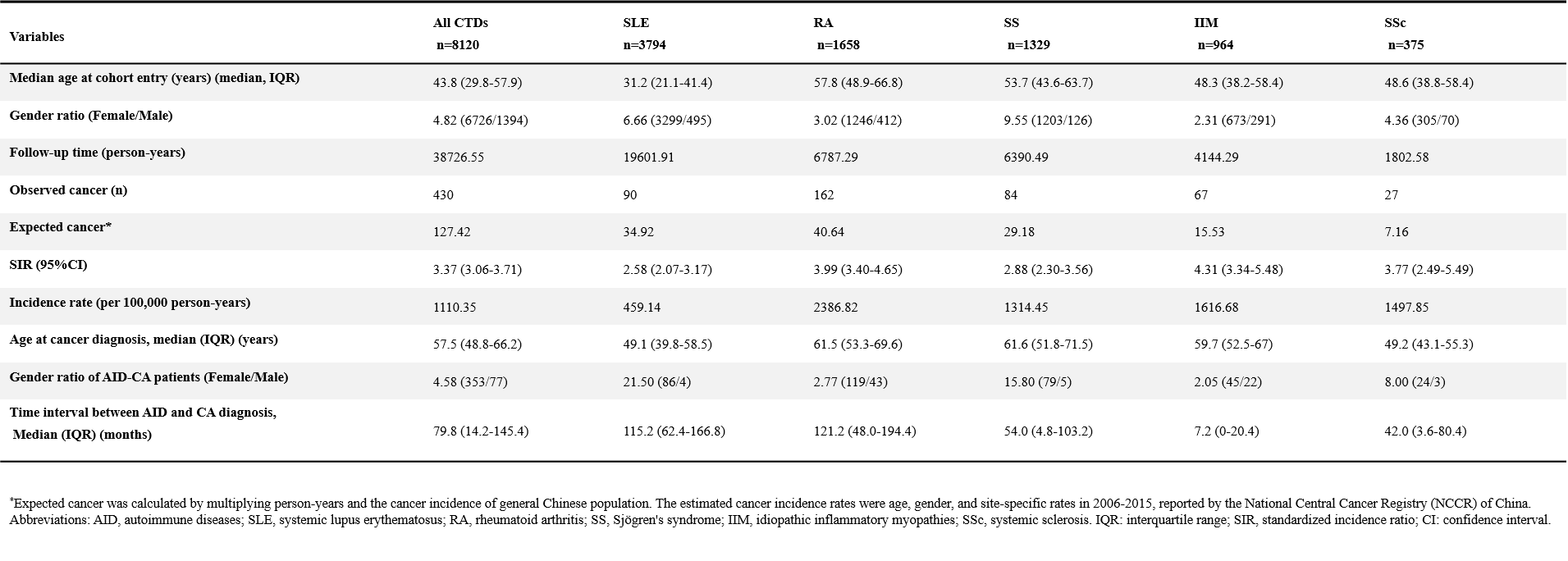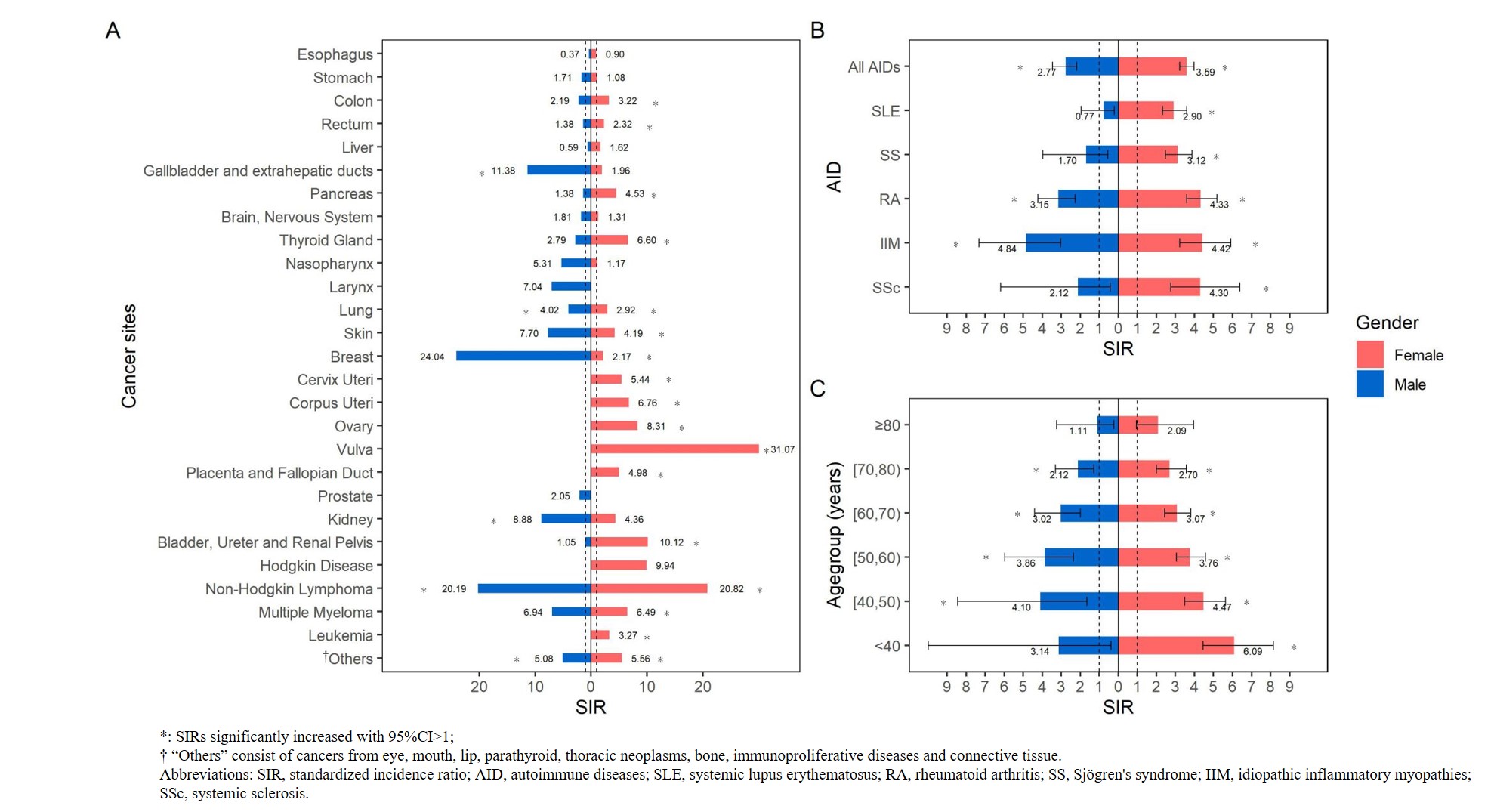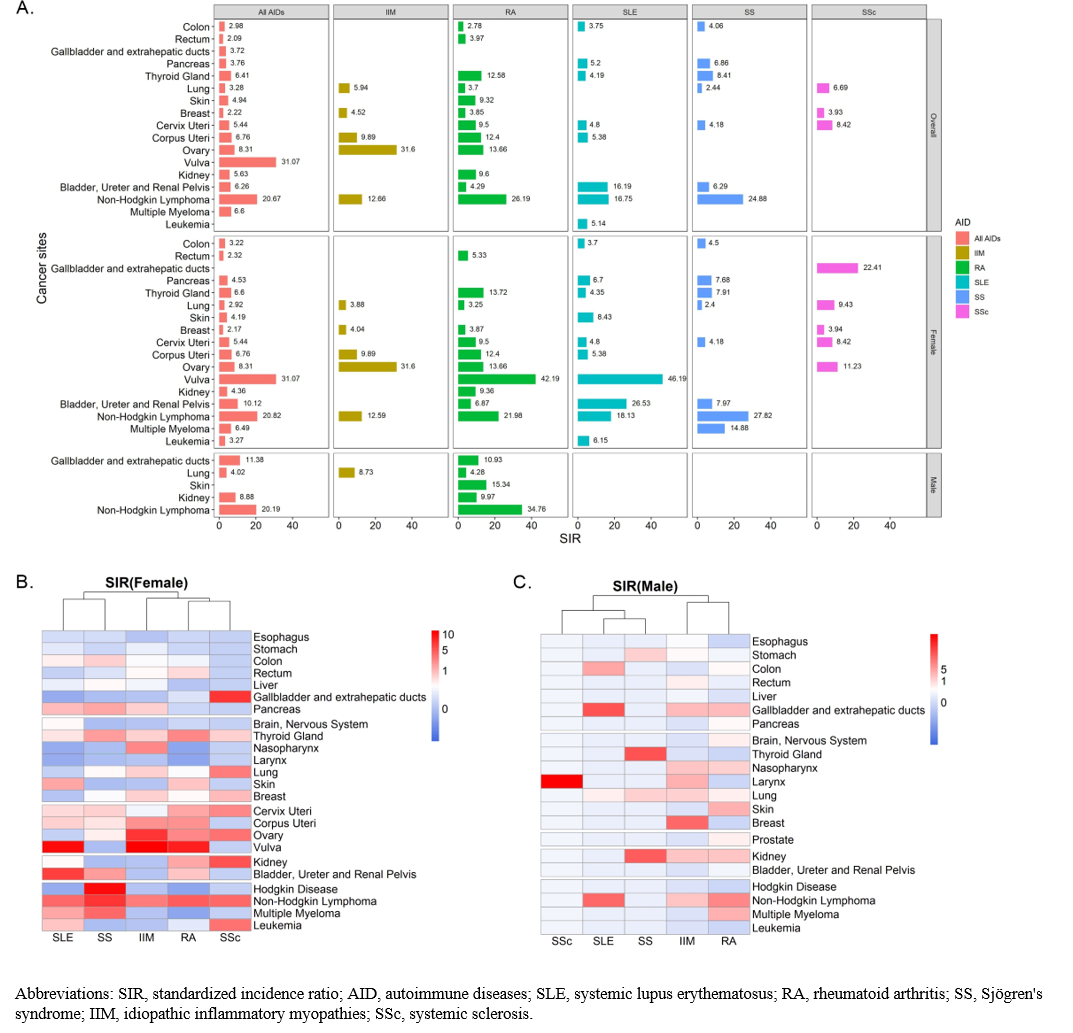Session Information
Date: Monday, November 8, 2021
Title: Epidemiology & Public Health Poster III: Other Rheumatic & Musculoskeletal Diseases (1022–1060)
Session Type: Poster Session C
Session Time: 8:30AM-10:30AM
Background/Purpose: Cancer is a comorbidity of concern for the long-term prognosis in autoimmune disease (AID) patients. This study investigated cancer incidence and risks in five major AIDs in a large cohort of Chinese patients, compared with the general population.
Methods: The cohort retrospectively enrolled 8120 AID inpatients with SLE, RA, SS, SSc, or IIM admitted to Peking Union Medical College Hospital from January 2006 to April 2015. Cancer occurrences were consecutively followed up by direct contact with the attending clinician or telephone. The demographics, distributions, and standardized incidence ratios (SIRs) were analyzed and compared among the five AIDs.
Results: During 38726.55 person-years of follow-up, 430 (5.3%) patients developed cancer, with a median age of 57.5 (IQR: 48.8-66.2) years and disease duration of 79.8 (IQR: 14.2-145.4) months after the diagnosis of AID (Table 1.). The estimated SIR in all AIDs was 3.37 (95%CI: 3.06-3.71), with the highest in IIM (4.31, 95%CI 3.34-5.48), followed by RA (3.99, 95%CI 3.40-4.65), SSc (3.77, 95%CI 2.49-5.49), SS (2.88, 95%CI 2.30-3.56) and SLE (2.58, 95%CI 2.07-3.17). Gender discrepancy of cancer risks existed, with SIR for female patients (3.59, 95% CI 3.23-3.99) higher than male (2.77, 95% CI: 2.19-3.46) (Fig. 1A, Fig. 1B). And SIR for younger patients (age< 50) was generally higher than older patients (age≥50) (Fig. 1C). Compared among the five major AIDs, each AID had distinctive features related to cancer (Fig. 2A-C). SLE had significantly increased SIRs of hematologic malignancies and solid tumors located in the urinary tract, female genital organs, pancreas, thyroid, and colon. SS also had a high SIR of non-Hodgkin’s lymphoma (NHL). IIM was closely associated with cancer, with 74.6% of cancers diagnosed within 3 years and had increased SIRs of ovarian, corpus uteri, lung, breast, and NHL. In RA populations, a wide distribution of cancers was detected after 15 years since the diagnosis of RA. For SSc, increased SIRs were observed in cervix uteri, lung, and breast cancers.
Conclusion: AID patients in China had an overall increased cancer risk than the general population, with varied site-specific cancer risks in gender, age groups, and AID types.
 Table 1. Demographics, follow-up, and cancer occurrence of the cohort and AID-CA patients.
Table 1. Demographics, follow-up, and cancer occurrence of the cohort and AID-CA patients.
 Fig. 1 Gender- and age-specific standardized incidence ratios (SIRs) in AID patients and subgroups. (A) SIRs of site-specific cancers for female and male. (B) SIRs in all and each type of AID patients for female and male. (C) SIRs in different age groups (every 10 years) for female and male.
Fig. 1 Gender- and age-specific standardized incidence ratios (SIRs) in AID patients and subgroups. (A) SIRs of site-specific cancers for female and male. (B) SIRs in all and each type of AID patients for female and male. (C) SIRs in different age groups (every 10 years) for female and male.
 Fig. 2 Site-specific standardized incidence ratios (SIRs) in AID patients and subgroups. (A) Significantly increased SIRs for high-risk cancer in all AID and five types of AID patients. (B) Heatmaps of SIRs in female patients clustered by type of AID. (C) Heatmaps of SIRs in male patients clustered by type of AID.
Fig. 2 Site-specific standardized incidence ratios (SIRs) in AID patients and subgroups. (A) Significantly increased SIRs for high-risk cancer in all AID and five types of AID patients. (B) Heatmaps of SIRs in female patients clustered by type of AID. (C) Heatmaps of SIRs in male patients clustered by type of AID.
To cite this abstract in AMA style:
Liu H, Zhou Z, Zhou Y, Zhou J, Yang Y, Yao Z, Zhou X, Zhang W, Zhao Y, Li M, Zeng X, Zhang F, Yang H, Zhang X. Do Cancer Risks Increased in the Five Major Autoimmune Diseases? A Large Cohort Study in China [abstract]. Arthritis Rheumatol. 2021; 73 (suppl 9). https://acrabstracts.org/abstract/do-cancer-risks-increased-in-the-five-major-autoimmune-diseases-a-large-cohort-study-in-china/. Accessed .« Back to ACR Convergence 2021
ACR Meeting Abstracts - https://acrabstracts.org/abstract/do-cancer-risks-increased-in-the-five-major-autoimmune-diseases-a-large-cohort-study-in-china/
